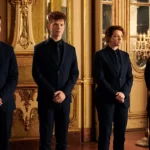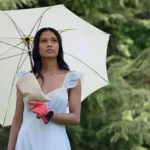REPRESENTATION OF SOCIAL ISSUES IN VAMPIRE ACADEMY
WARNING: Vampire Academy TV Series Spoilers Below
The Vampire Academy television adaptation highlighted truly important issues in our society. The show provided support and representation to a myriad of fans based on different social issues. This page discusses important ideas explored in the Vampire Academy television series. It contains both spoilers and topics that could possibly be triggering. Please expand the below sections to read more on these issues.

Female Role Models (Bechdel Test)
Vampire Academy focuses on the relationship of two young women (Rose and Lissa.) The two discuss topics such as class and power, family, trauma, and more.
Lissa and Rose are role models for women around the world. They stay centered around their own personal needs and their friendship. Although love interests enter into both their lives, the women's conversations do not suddenly focus on their relationships and only their relationships. The Vampire Academy television series absolutely smashes the Bechdel Test.

Race & Class
Vampire Academy has four "races": Moroi (full vampires), Dhampirs (half vampires), Humans, and Strigoi (evil vampires.) Class structures (or "castes") are based on these races.
While Moroi are the highest class, they are not all made equal. Tied in with religious power, the "Royal Moroi" are granted higher status (opportunities and connections, protection, etc) than the "non-Royal Moroi."
The unjust system is immediately sickening to viewers. Because Vampire Academy discusses race in relation to "blood" rather than skin pigment, viewers are exposed to discussions around structural racism and class oppression in a way that does not automatically cause culturally-ingrained defenses. In other words, viewers can more "safely" explore issues of structural racism and classism, and then apply the mythical world of Vampire Academy to the lived experiences of class and race (based on skin tone) in their everyday world.
Succinctly put: racism is wrong. Vampire Academy makes clear that discrimination based on someone's genetics is unacceptable.

Underrepresented Groups in Media
Additional information on this topic coming soon
BIPOC (Black, Indigenous, People of Color)
Vampire Academy's two female leads are women of color. It's particularly satisfying to watch a black woman (Sisi Stringer) kick a** on screen. Her character, Rose, has layers upon layers to her personality; she is strong, loyal, creative, and adventurous (and so much more.) Vasilisa is played by Latina actress, Daniela Nieves. She displays softer characteristics yet maintains a fiery spirit in pursuit of a better world.
A large majority of the cast is played by biPOC actors. Some actors include Lissa's love interest (Christian, played by André Dae Kim); Victor Dashkov and his husband Robert (J. August Richards & Cornelius Macarthy); resident beautiful-baddie, Tatiana (Anita-Joy Uwajeh); one part of the love triangle, Mason (Drew Liner); spirit user Sonya (Jonetta Kaiser); and more.
Not only do biPOC fans get the representation they truly deserve with two female leads, they even get some resident baddies. Bipoc actors are not forced into narrow, stereotypical storylines but, rather, are fleshed out into characters that allow these amazing actors to truly display their talents. Moreso, the show carries a double entendre throughout. Vampire Academy discusses "race" in terms of bloodlines and not based on skin color. It takes no effort whatsoever to understand how horrible discrimination based on race is in The Dominion. Viewers should absolutely be making the connection that stereotypes and discrimination based on race in The Dominion is as awful as the structural racism bipoc face in our day-to-day lives.
In summary, Vampire Academy showcases amazing bipoc actors in complex roles while holding back no punches in calling out the evils of racism.
Disabilities
Characters with disabilities are hard to find in fantasy or supernatural media. It is even rarer for such characters to be fully fleshed out, with their disability not the focus of their story. Vampire Academy features two strong characters whose disabilities do not define them.
The first is Abby Batista, an influential Royal Moroi who happens to be deaf. Abby communicates via sign language and an interpreter. In one scene, we see Victor Dashkov signing his thanks to her. As an important voice in Moroi politics, Abby’s disability does not define her character.
In episode seven, “Beyond the Wards,” viewers are introduced to Clarice, an exiled Moroi scholar living in the human world in Portugal. Clarice and the forbidden knowledge she possesses are vital for Lissa to understand the element of Spirit. While Clarice has a limb difference, it is not explicitly mentioned. Viewers see Clarice killing a Strigoi by using her elemental magic (fire). She is shown as resourceful and insightful.
LGBTQIA+
The beauty of the representation of LGBTQIA+ couples and people in Vampire Academy is how utterly normalized they are. There is never a discussion about their sexualities or a coming-out. Their homosexuality is not an obstacle in their social relationships, political endeavors, or professional opportunities. They are embraced and welcomed by their peers. There is much more of a focus on their difference in class than on their sexual orientation.

Child Abuse & Neglect
Jesse has been represented in numerous ways through the Vampire Academy media. The television series brought in new layers to his character. One important aspect is exploring the mental and emotional trauma caused by an abusive father. Jesse's healing has only just begun at the end of Season 1 -- and deserves to be explored more fully.
One consistent plot point in the Vampire Academy series is Christian's parents turning strigoi. Part of Christian's journey is both dealing with child abandonment and the pressure that children experience when society holds them responsible for actions that were done to them and for which they are not responsible. As Lissa said, "Your parents are not you. Their choices don’t define you. Their actions don’t mark you, and I’m sorry for everyone who has ever made you feel otherwise."
While the example in Vampire Academy's television series speaks to parental actions for which children are often punished, it can also be applied to other traumatic situations where acts have been unfairly put upon another human being such as physical and sexual assault.
Vampire Academy has an important message for trauma victims: You are not responsible for other people's choices or actions. They do not define or mark you. And you should never, ever, feel responsible for being made a survivor of trauma.

Mental Health (Depression, Trauma)
Mental health is an important focus in the Vampire Academy book series and this has carried through its TV adaptation. Two essential elements of the plot directly relate to mental health issues around depression, trauma (including post-traumatic stress disorder), and self-harm.
The audience is immediately introduced to three of the core four struggling with post-traumatic stress disorder and depression after the loss of parents. In Lissa and Rose's case, this was the loss of Lissa's family in a car accident. For Christian, it was his parents' choice to "die" and turn Strigoi. Also suffering from mental health challenges is Jesse whose anger and arrogance are a mask for a child who suffers greatly from child abuse.
The second mental health plot point centers around the use of spirit. Because Lissa is just starting to experience the effects of spirit, we are part of the journey as the depression sets in. The end of Season 1 leaves off where the books start, so we assume that this plot would be further explored in continuing seasons.
Unlike the book, we have the joy of knowing Sonya before she turns strigoi. Sonya's character has been using spirit for an extended period, and her struggles with depression and self-harm eventually lead to her decision to turn.

Sex Work & Reproductive Rights
One of Vampire Academy’s original characters who does not appear in the book series is Silver, played by Louisa Connolly-Burnham. Viewers are introduced to Silver as a “bloodwhore,” a Dhampir sex-worker. Bloodwhores are looked down upon because they often allow Moroi men who pay for their services to drink their blood. Other Dhampir women are forced to live in communes and remain available to “entertain” Moroi men. They are essentially breeding factories with their main role in society being to produce future Guardians.
Silver is also the love interest of spoiled Royal Moroi, Jesse Zeklos. Despite their differences in status, Silver expects Jesse to treat her with respect and turns him down when he fails to do so. In a society where Dhampir women have few choices, Silver is neither a Guardian nor living in the Communes to birth children. Instead she is depicted as an independent woman who makes her own choices. In summary, Vampire Academy explores female gender roles in very stark terms; women are allowed to risk their lives as Guardians, become breeding factories, or are sex workers. More episodes are needed to more fully explore the important societal elements of sex work and reproductive choice.

Religious Oppression & Control
Religion and the church play a major role in the Moroi world of Vampire Academy. Religious oppression, religious abuse, and recovery are important themes that are explored with a compassionate lens. Dhampir Dimitri is devout, despite the fact that the religion oppresses his race. Dhampirs are viewed as either highly trained weapons to protect the Moroi or vessels for reproduction. When morally questionable policies that greatly impact Dhampir lives are sanctioned by religious leaders, Dimitri begins to question everything that he believes in. Dimitri’s story resonates with viewers who have left their religion, are questioning their religious beliefs, or have even been oppressed by their religion or the religion of others.

Interracial Couples
More on this topic coming soon

Policy Manipulation & Outdated Laws
More on this topic coming soon

Representation in Politics
More on this topic coming soon
